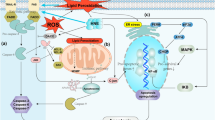Abstract
Purpose: We previously found that ethanol-induced apoptosis is associated with an activation of caspase-3. However, the initial triggering of this process is yet unknown. Therefore, the present study was designed to determine whether the Fas-receptor pathway plays a role in the initiation by ethanol of human hepatocellular carcinoma (HepG2) cell apoptosis. Methods: HepG2 cells were incubated with or without 1 mM ethanol for 24 h. Apoptosis was assessed by DNA fragmentation and caspase-8 activity. Selective inhibitors of caspase-8 and caspase-9 were used to analyze the role of both caspases on apoptosis. Soluble human Fas ligand (Fas-L) was determined by enzyme-linked immunosorbent assay (ELISA). A fluorescent dye was used to investigate the permeability of the mitochondrial outer membrane. A recombinant Fas fusion protein was used to inhibit the activation of Fas receptors. Human anti-Fas-L antibody was employed to neutralize Fas-L released from the cells. Results: Caspase-8 activity increased significantly threefold (P < 0.005) after 12 h incubation of HepG2 cells with 1 mM ethanol whereas no change was observed in control cells. Incubation with caspase-8 inhibitor completely prevented apoptosis induced by ethanol (P < 0.001). In contrast, a caspase-9 inhibitor did not significantly reduce apoptosis. The permeability of the outer mitochondrial membrane was not altered. Neutralization of Fas-receptors by Fas fusion proteins completely attenuated ethanol-induced apoptosis in HepG2 cells treated with ethanol. Conclusions: These findings show that apoptosis induced by low concentrations of ethanol in human HepG2 cells is associated with Fas-receptor activation and subsequent caspase-8 activation. Triggering of apoptosis through Fas-receptors represents a mechanism of action different from that observed with high concentrations of ethanol.
Similar content being viewed by others
Author information
Authors and Affiliations
Additional information
Received: 22 August 2000 / Accepted: 10 November 2000
Rights and permissions
About this article
Cite this article
Castañeda, F., Kinne, R. Apoptosis induced in HepG2 cells by short exposure to millimolar concentrations of ethanol involves the Fas-receptor pathway. J Cancer Res Clin Oncol 127, 418–424 (2001). https://doi.org/10.1007/s004320000227
Issue Date:
DOI: https://doi.org/10.1007/s004320000227




